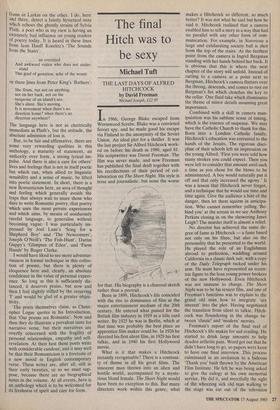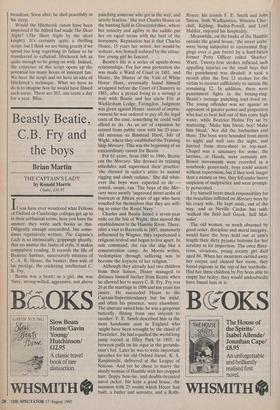The final Hitch was to be sexy
Michael Tuft
THE LAST DAYS OF ALFRED HITCHCOCK by David Freeman Michael Joseph, f12.95 In 1966, George Blake escaped from Wormwood Scrubs. Blake was a convicted Soviet spy, and he made good his escape via Finland to the anonymity of the Soviet Union. An ideal plot for a thriller. It was the last project Sir Alfred Hitchcock work- ed on before his death in 1980, aged 81. His scriptwriter was David Freeman. The film was never made, and now Freeman has published the final draft together with his recollections of their period of col- laboration on The Short Night. His style is terse and journalistic, but none the worse
for that. His biography is a charcoal sketch rather than a portrait.
Born in 1899, Hitchcock's life coincided with the rise to dominance of film as the major entertainment medium of the 20th century. He entered what passed for the British film industry in 1919 as a title card writer. By 1925 he was in Berlin, which at that time was probably the best place an apprentice film maker could be. In 1926 he directed his first silent film, in 1929 his first talkie, and in 1940 his first Hollywood movie.
What is it that makes a Hitchcock instantly recognisable? There is a continui- ty of theme in all his great films. The innocent man thrown into an alien and hostile world, accompanied by a myste- rious blond female. The Short Night would have been no exception to this. But many directors work within this genre; what makes a Hitchcock so different, so much better? It was not what he said but how he said it. Hitchcock realised that a camera enabled him to tell a story in a way that had no parallel with any other form of com- munication. For example, in Notorious a large and exhilarating society ball is shot from the top of the stairs. At the furthest point from the camera is Ingrid Bergman standing with her hands behind her back. It is obvious that this is where the next chapter of the story will unfold. Instead of cutting to a camera at a point next to Bergman, Hitchcock's camera flutters over the throng, descends, and comes to rest on Bergman's fist which clenches the key to the cellar. One fluid take which illuminates the theme of minor details assuming great importance.
Combined with a skill in camera man- ipulation was his sublime sense of timing, which is the essence of suspense. We may have the Catholic Church to thank for this. Born into a London Catholic family, Hitchcock's education was entrusted to the hands of the Jesuits. The rigorous disci- pline of their schools left an impression on the young Alfred. 'First you were told how many strokes you could expect. Then you were left to consider that amount until such a time as you chose for the blows to be administered. A boy would naturally put it off and that only increased the agony.' It was a lesson that Hitchcock never forgot, and a technique that he would use time and time again. Give the audience a hint of the danger, then let them squirm in anticipa- tion. Who cannot remember yelling 'Be- hind you' at the screen as we see Anthony Perkins closing in on the showering Janet Leigh? The murder itself is almost a relief.
No director has achieved the same de- gree of fame as Hitchcock — a fame based not only on his films, but also on the personality that he presented to the world. He played the role of an Englishman abroad to perfection, waddling around California in a classic dark suit, with a copy of the Daily Telegraph tucked under his arm. He must have represented an eccen- tric figure to the lean young power-brokers of the new Hollywood. Even Hitchcock was not immune to change. The Short Night was to be his sexiest film, and one of Freeman's functions was to explain to the grand old man how to integrate 'sex interest' into the plot. Having negotiated the transition from silent to talkie, Hitch- cock was floundering in the change be- tween 'classic' and 'modern' movies.
Freeman's report of the final reel of Hitchcock's life makes for sad reading. He started to drink large amounts to help deaden arthritic pain. Word got out that he didn't have long to go, so papers were keen to have one final interview. This process culminated in an invitation to a hideous `Thank you' bash thrown by the American Film Institute. He felt he was being asked to give the eulogy at his own memorial service. He did it, and mercifully the sight of the wheezing sick old man walking to the stage was cut out of the television broadcast. Soon after, he died peacefully in his sleep.
Would the Hitchcock canon have been improved if Sir Alfred had made The Short Night? (The Short Night by the short knight). It's certainly quite a thrilling script, but I think we are being greedy if we spend too long regretting its failure to be transferred to celluloid. Hitchcock left us quite enough to be going on with. Indeed, the existence of this script opens up the potential for many hours of innocent fun. We have the script and we have an idea of Hitchcock's technique. What we have to do is to imagine how he would have filmed each scene. There are 365, one scene a day for a year. Bliss.















































 Previous page
Previous page